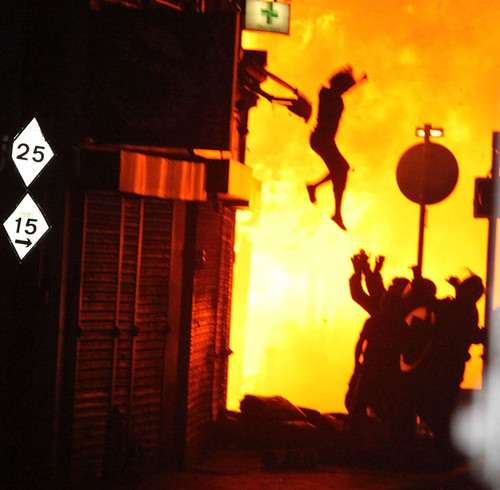
Like many of you, I am experiencing an interpretation of the riots taking place in London through a mediated lens of retweeted photographs [see image above], blog posts, +1d news articles, and forums sharing freshly sparked memes. Nested commenting across online sources-like this video/blog post/tweet-are rich and inherently different from how information is shared and absorbed than ever before.
The experiences of the urban youth that are engaged in political dissonance, in resistance, in bringing social issues to the foray are, in many ways, retelling a narrative that I’m already uncomfortably familiar with. The prominence of looting and of reprehensible behavior in the dominant narrative here echoes the social discourse of looters during Katrina and Rodney King (events so engrained in America’s consciousness I can signal them through proper nouns only somewhat associated with the events themselves).
As I continue to follow along with what is happening–now geographically distanced from the culturally familiar–I am struck by the fact that this is precisely the urgency for a widespread induction of critical engagement with participatory media and its resulting media literacies in formal schools. Right now, it is the livelihood and well-being of entire communities at stake. Technology’s role in mediating resistance efforts across global channels means that a media literacy today extends directly into illuminating these repeating narratives and in equipping a generation of youth with the tools to successfully interpret, contribute to, and reflect upon the myriad thread of information about physical world activism and protest. A pedagogy of participatory media begins with what is happening in the streets of England right now and empowers educators and students alike in transforming & challenging dominant narratives.
I’m spending the day catching up on all this. I was in the isolation bubble of being on set for a week, so I’ve only caught a bit of the news here and there on the radio in the mornings. And a few UK radio programs, that from a far sounded dangerously racist, as well as laced with incorrect information. The dominant narrative isn’t required to get it right, so much as just be loud and repetitive. Ergo the need for participatory media.
It’s an overwhelming business that doesn’t bother talking about what urban youth (of color or not) in the UK are struggling with on a daily basis. But it’s a story that’s been played out not only here on repeat but in the UK as well… on repeat (e.g. the Brixton Riots). Europe is struggling just as much as we are with a list of social ills. I find the fact that the Daily Mail’s lead story is, “Falling from the sky: Inside the abandoned ‘ghostscrapers’ that litter the U.S. as desolate monuments to fading American dreams” a diversion from the British Dream going souring.
Wait, I don’t even know if there is a “British Dream.” But it’s a definite diversion. If the dominate narrative for the middle class (the Daily Mail, etc.) doesn’t address what’s really going on and the causes for discord and the escalation at this level then urban youth will continued to be villainized.